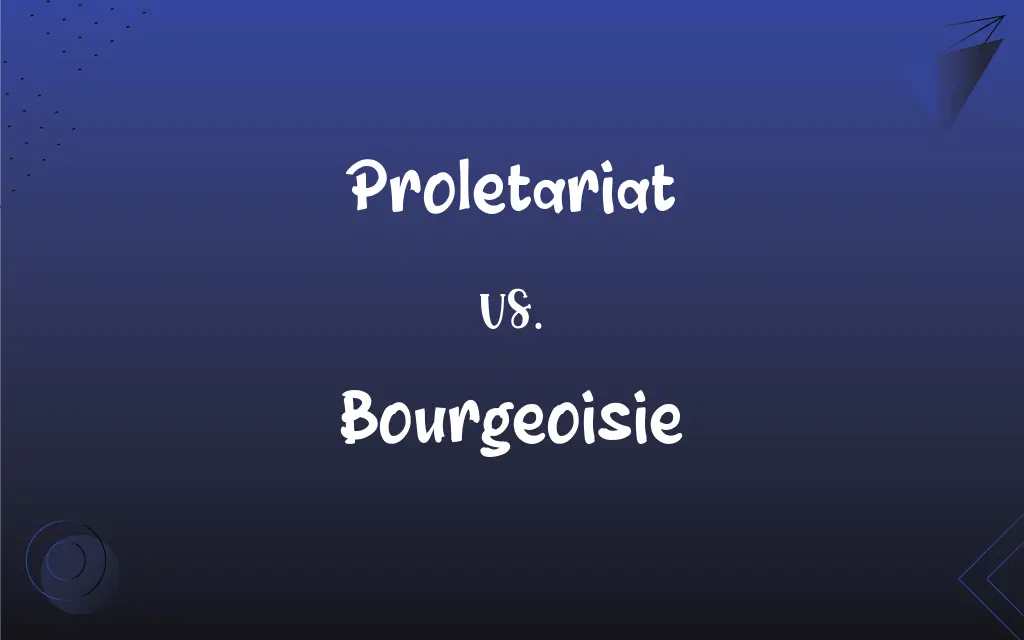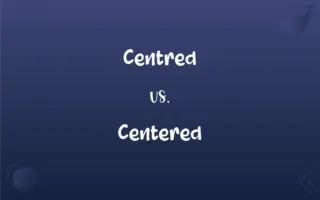Proletariat vs. Bourgeoisie: What's the Difference?
Edited by Aimie Carlson || By Harlon Moss || Updated on November 12, 2023
Proletariat refers to the working class who sell their labor for wages. Bourgeoisie refers to the capitalist class who own the means of production.

Key Differences
The proletariat represents the working class in Marxist theory, who do not own the means of production and must sell their labor to survive. While, the bourgeoisie is the class that owns the means of production and capital, and employs the proletariat.
The proletariat is primarily involved in manual or industrial labor, generating value through their work, but not owning the products of their labor. The bourgeoisie, on the other hand, controls production and profits from the labor of the proletariat, reinforcing their economic status.
Historically, the rise of the proletariat accompanied industrialization, where laborers worked in factories owned by the bourgeoisie. The bourgeoisie emerged with the decline of feudalism, becoming the dominant economic class through capital accumulation and control of production.
The proletariat is often associated with efforts to improve working conditions, wages, and rights, sometimes advocating for socialism or communism. The bourgeoisie tends to support capitalism and policies that protect property rights and capital accumulation.
In Marxist theory, the struggle between the proletariat and bourgeoisie is central to the dynamics of capitalism, leading to class conflict. Marx predicted that this conflict would eventually lead to the proletariat overthrowing the bourgeoisie and establishing a classless society.
ADVERTISEMENT
Comparison Chart
Class Status
Working class, laborers
Capitalist class, owners
Means of Production
Do not own, work for wages
Own and control
Economic Role
Produce goods, manual labor
Manage production, profit from labor
Historical Emergence
Rose with industrialization
Emerged with the decline of feudalism
Political Interests
Often support socialism/communism
Generally support capitalism
ADVERTISEMENT
Proletariat and Bourgeoisie Definitions
Proletariat
The class of workers who sell their labor.
The proletariat is crucial to the factory’s operations.
Bourgeoisie
The class that employs the working class.
The bourgeoisie were often in conflict with labor unions.
Proletariat
Those who perform manual or industrial labor.
The proletariat formed the backbone of the industrial revolution.
Bourgeoisie
The class that owns production means.
The bourgeoisie benefited greatly from industrial profits.
Proletariat
Those who don’t own the means of production.
The plight of the proletariat was a central theme in Marxist theory.
Bourgeoisie
The economically higher class in capitalism.
The bourgeoisie held significant political influence.
Proletariat
The economically lower class in capitalism.
The proletariat's conditions sparked the labor movement.
Bourgeoisie
Those who own factories, land, or businesses.
The bourgeoisie invested in new technologies.
Proletariat
Individuals who earn wages, not owning production.
The proletariat often struggles for fair wages.
Bourgeoisie
Those who own significant property.
The lifestyle of the bourgeoisie was often luxurious.
Proletariat
The class of industrial wage earners who, possessing neither capital nor production means, must earn their living by selling their labor.
Bourgeoisie
The middle class.
Proletariat
The poorest class of working people.
Bourgeoisie
In Marxist theory, the social group opposed to the proletariat in the class struggle.
Proletariat
The propertyless class of ancient Rome, constituting the lowest class of citizens.
Bourgeoisie
(historical) A class of citizens who were wealthier members of the third estate.
Proletariat
The lowest class of society; also, the lower classes of society generally; the masses.
Bourgeoisie
(Marxism) The capitalist class.
Proletariat
(Marxism) Wage earners collectively, excluding salaried workers; people who own no capital and depend on their labour for survival; the working class, especially when seen as engaged in a class struggle with the t=the capital-owning class.
Bourgeoisie
The French middle class, particularly such as are concerned in, or dependent on, trade.
Proletariat
The lowest class of citizens, who had no property and few rights, and were regarded as contributing only their offspring to the state.
Bourgeoisie
The social class between the lower and upper classes
Proletariat
The indigent class in the State; the body of proletarians.
Proletariat
A social class comprising those who do manual labor or work for wages;
There is a shortage of skilled labor in this field
FAQs
What is the bourgeoisie's key characteristic?
The bourgeoisie is characterized by their ownership of the means of production.
Do the proletariat own any production means?
No, the proletariat does not own the means of production.
What historical conditions led to the bourgeoisie’s rise?
The bourgeoisie rose to prominence with the decline of feudalism and the growth of capitalism.
Are proletariat and bourgeoisie always antagonistic?
In Marxist theory, there is an inherent class struggle between the proletariat and bourgeoisie.
Can a member of the proletariat become bourgeoisie?
Yes, through accumulation of capital and ownership, a proletariat can become part of the bourgeoisie.
What defines the proletariat?
The proletariat is defined by their role as laborers who sell their labor for wages.
How do proletariat and bourgeoisie differ in political views?
The proletariat often favors socialism or communism, while the bourgeoisie supports capitalism.
How does the bourgeoisie generate profit?
The bourgeoisie generates profit from the surplus value produced by the proletariat’s labor.
Did Marx view the proletariat as revolutionary?
Yes, Marx saw the proletariat as potentially revolutionary, capable of overthrowing the bourgeoisie.
How did the proletariat emerge?
The proletariat emerged with the rise of industrialization and factory work.
What happens to the proletariat in a capitalist society?
In a capitalist society, the proletariat may face exploitation and economic challenges.
What is the bourgeoisie's role in the economy?
The bourgeoisie plays a central role in managing production and capital.
What is the proletariat's main source of income?
The proletariat’s income primarily comes from wages for their labor.
How does the bourgeoisie influence politics?
The bourgeoisie influences politics through capital, often supporting policies that protect their interests.
Is the bourgeoisie always wealthy?
While typically wealthy, the bourgeoisie's defining feature is their ownership of production means, not just wealth.
How did industrialization affect the proletariat?
Industrialization led to the expansion of the proletariat, but also to their exploitation.
What is the ultimate goal of the proletariat in Marxist theory?
The ultimate goal is to overthrow the bourgeoisie and create a classless society.
What rights do the proletariat typically fight for?
The proletariat often fights for better wages, working conditions, and labor rights.
Do the bourgeoisie always control the government?
Not always, but the bourgeoisie often has significant influence over government policies.
Can the proletariat own small businesses?
Owning a small business might elevate a proletariat to a lower tier of the bourgeoisie, depending on the scale.
About Author
Written by
Harlon MossHarlon is a seasoned quality moderator and accomplished content writer for Difference Wiki. An alumnus of the prestigious University of California, he earned his degree in Computer Science. Leveraging his academic background, Harlon brings a meticulous and informed perspective to his work, ensuring content accuracy and excellence.
Edited by
Aimie CarlsonAimie Carlson, holding a master's degree in English literature, is a fervent English language enthusiast. She lends her writing talents to Difference Wiki, a prominent website that specializes in comparisons, offering readers insightful analyses that both captivate and inform.































































